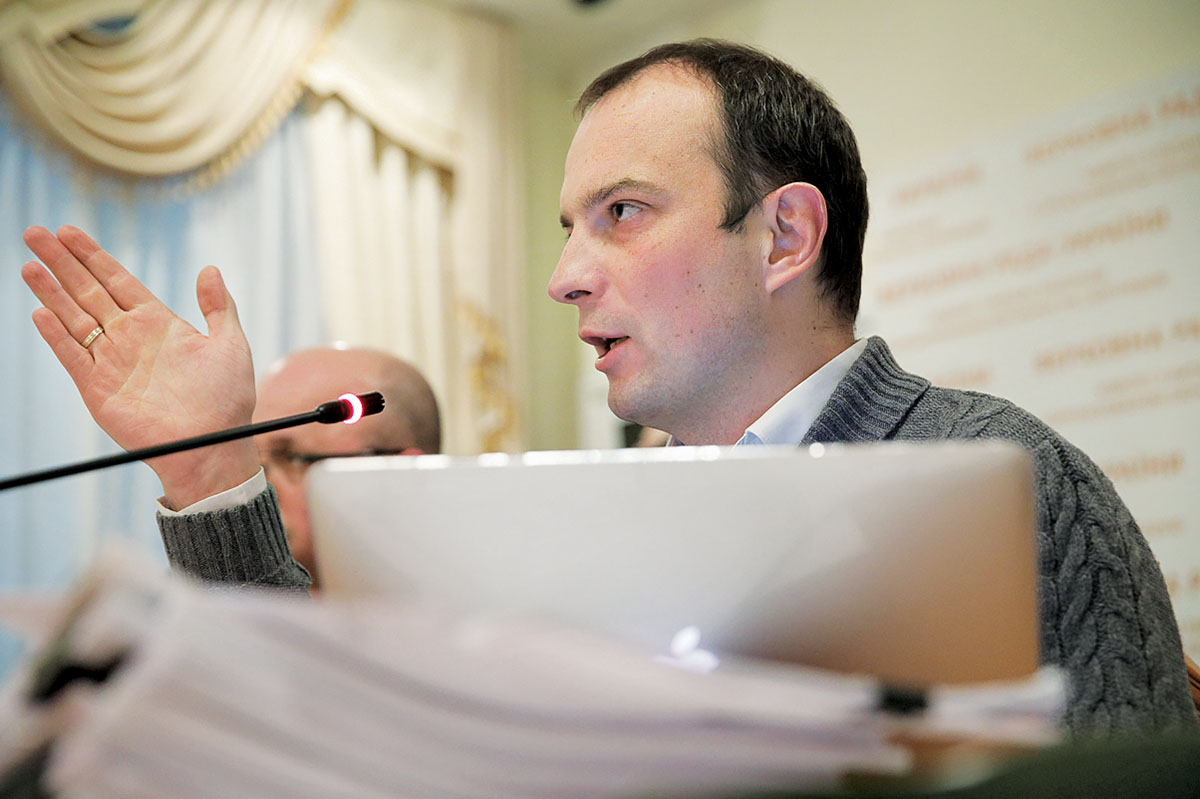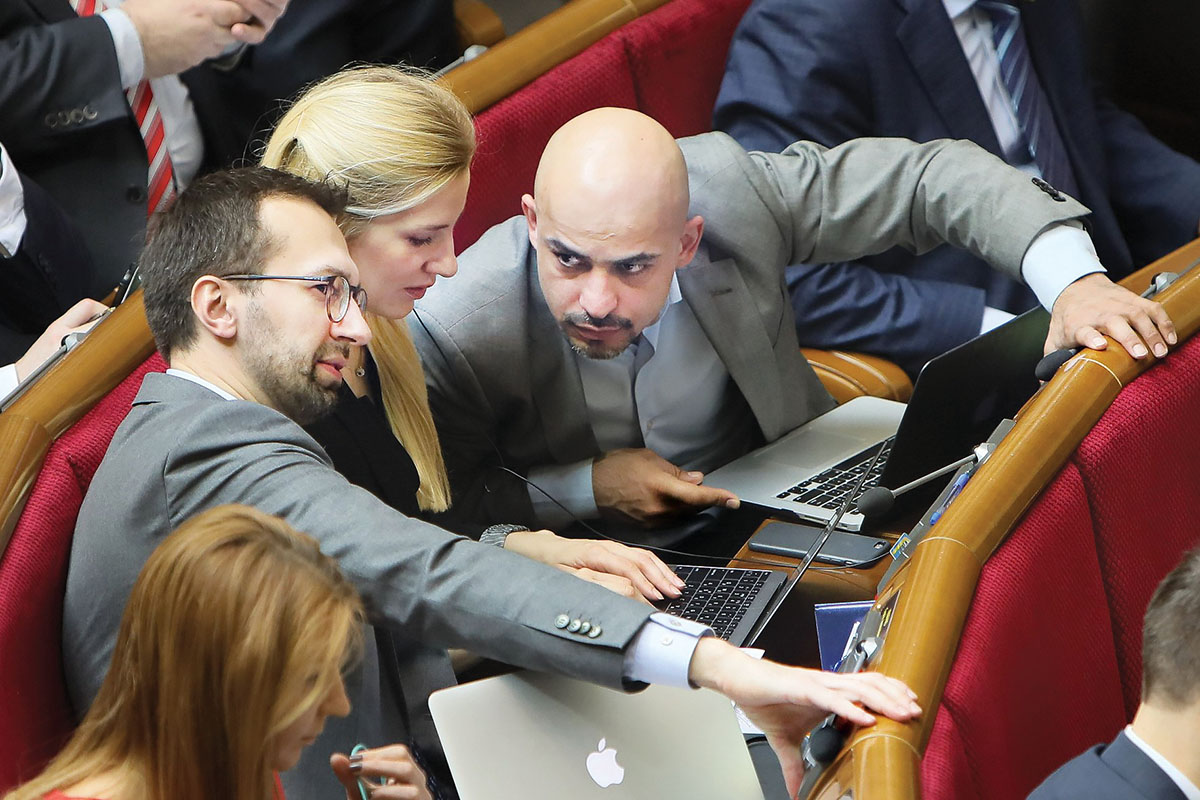It was a cold shower for Ukraine’s establishment politicians. They were decimated during Ukraine’s July 21 parliamentary elections. Individuals who had never before served in parliament won 75 percent of the seats in the country’s legislature.
This crushing defeat came as the result of public dissatisfaction with parliament’s inability to implement reforms, improve the standard of living in the country and demonstrate concrete results in the fight against corruption.
Among the ousted lawmakers were individuals of dubious reputations — lawmakers who have become the focus of journalistic investigations that reveal their lavish lifestyles and uncover corruption schemes.
But the ousted lawmakers also include individuals who proved decisive in pushing for the establishment of Ukraine’s High Anti-Corruption Court, reforming the country’s law enforcement agencies and serving as whistleblowers against corruption and dysfunction in Ukraine’s courts.
Despite their contributions, most of them didn’t make it into parliament, losing re-election bids on party lists or in single-member districts. A few even declined to run at all.
We’re taking a look at 10 lawmakers who proved to be effective, yet were not reelected, and 10 new lawmakers who could spearhead the drive for reforms in Ukraine’s new parliament.
They will be missed
On June 11, the Chesno civic organization published a report concluding that 13 members of the Samopomich faction were among the 25 most honest politicians in parliament.
That was hardly a surprise. Samopomich, which received 11 percent of the vote in the 2014 parliamentary elections, was a strong proponent of reform. However, internal turmoil fragmented the party. In the July 21 election, it received less than 1 percent of the vote.
Samopomich members Yehor Sobolev, 42, Olena Sotnyk, 36, and Viktoria Voytsitska, 44, were among the most active lawmakers pushing for Ukraine’s Euro-Atlantic integration and supporting the creation of corruption prevention agencies.
Sobolev, the deputy head of the 25-member faction, chaired the parliament’s anti-corruption committee until 2017 and was among the co-authors of a series of important laws on creating and maintaining the independence of the National Anti-Corruption Bureau of Ukraine and introducing the online asset declarations for government officials.
He also co-authored the law on de-communization, helping the country to leave behind its Soviet past.
Sobolev left the Samopomich party a couple of months before the election and didn’t stand for re-election. Instead, he plans to focus on creating his own political party.

Yehor Sobolev leads the parliament’s anticorruption committee, on Nov. 15, 2017, a month before the committee members voted him out. (Volodymyr Petrov)
Lawyer-turned-politician Sotnyk was the secretary of the subcommittee in charge of coordinating Ukraine’s legislature with its European Union parliament. She also served as the head of the Parliamentary Assembly of the Council of Europe’s legal committee. In Ukraine’s parliament, she co-authored the law creating the State Bureau of Investigations, a body tasked with investigating the crimes of top state officials.
Prior to the 2019 parliamentary election, Sotnyk left Samopomich and joined the Strength and Honor party. But it failed to overcome the 5-percent threshold to enter parliament, receiving slightly less than 4 percent of the party list vote.
Sotnyk will now concentrate on her studies: she has become the first Ukrainian woman ever to be selected for the Yale World Fellows Program.
Another member of Samopomich, Voytsitska, was an active proponent of easing doing business in Ukraine. During the most recent election, Voytsitska ran in a rural single-member district in Rivne Oblast. Her candidacy enjoyed the support of the newly-established Voice party, led by rock-star turned politician Sviatoslav Vakarchuk. Nonetheless, Voytsitska was defeated, receiving only 5 percent of the vote.
One of the clearest examples of the internal turmoil that would eventually kill Samopomich was the party’s decision to expel two of its most productive lawmakers.
In 2015, after a vote for constitutional amendments on decentralization that drew strong public opposition and eventually failed, five lawmakers were thrown out of Samopomich. Among them were Hanna Hopko, 37, and Viktoria Ptashnyk, 36.
Hopko, who heads the parliament’s foreign affairs committee, was a prominent supporter of Ukraine’s language law, adopted on April 15, and a vocal public health advocate who focused on decreasing the use of tobacco in the country.
Ptashnyk, a lawyer prior to becoming a lawmaker, co-authored laws on economic liberalization and promoted the independence of the State Anti-Monopoly Committee.
Both Hopko and Ptashnyk supported implementing anti-corruption reforms in Ukraine. Eventually, Hopko decided not to run in the parliamentary election this year, while Ptashnyk ran in a single-member constituency in downtown Kyiv. She also was endorsed by the Voice party, but ultimately lost, receiving less than 10 percent of the vote.
Svitlana Zalishchuk, 36, Sergii Leshchenko, 38, and Mustafa Nayyem, 38, are also among the most well-known activists who were elected into parliament in 2014. They all swept into the legislature on the then-popular Petro Poroshenko Bloc’s party list.
All three were also co-authors and fierce supporters of most reforms that received a vote in parliament. Nayyem is better known for his work in reforming Ukraine’s patrol police. Leshchenko is known for drawing attention to corruption schemes supported by lawmakers and government officials. And Zalishchuk is noted for her service on the foreign affairs committee promoting Euro-Atlantic integration.
Zalishchuk and Leshchenko are also vocal supporters of equal rights for the LGBTQ community. In 2015, they became the first Ukrainian lawmakers to participate in Kyiv Pride.
Both of them ran in July elections as independent candidates in single-member districts. However, both came in third, failing to win a seat in parliament. Zalishchuk told the Kyiv Post that she has already received multiple job offers to remain in the public sector, while Leshchenko declined to comment. He said he will be open to talking in a couple of weeks.
Nayyem didn’t run for re-election. But he said he would like to keep working on reforming Ukraine’s law enforcement agencies.
Adding to the list of vocal reform supporters who were not reelected are Oleksiy Ryabchyn, 36, and Nataliya Katser-Buchkovska, 36. The two young lawmakers actively supported reforms of the energy market.
Katser-Buchkovska also consistently promoted Ukraine’s bid to become an official ally of NATO.
Ryabchyn, who was elected through former Prime-Minister’s Yulia Tymoshenko Batkivshchyna’s party list, remained with the party, yet was too far down the list to get into parliament this time.
Katser-Buchkovska, joined Prime Minister Volodymyr Groysman’s new party, but the party itself failed to receive 5 percent of the vote and didn’t make it into parliament.

From left: Sergii Leshchenko, Svitlana Zalishchuk and Mustafa Nayyem participate in a parliament session, on April 4, 2017. (UNIAN)
Next generation
The new parliament also includes lawmakers broadly viewed as reformist.
Several of them are arriving in parliament on the list of the Servant of the People, which received 254 out of 424 seats and now can singlehandedly govern the country. While a lot is expected from the party itself, David Arakhamia, 40, Anastasia Krasnosilska, 35, and Andriy Gerus, 37, are among those expected to push for concrete reforms.
Arakhamia, 40, also known as David Braun, was a successful businessman prior to joining politics. He created a number of IT startups, including Template Monster, a company specializing in web design. In 2014, he co-founded a volunteer organization called the People’s Project that helps to raise money for Ukraine’s armed forces. He later headed Defense Ministry’s procurement department.
Arakhamia is an outspoken supporter of economic liberalization.
Krasnosilska, 35, is expected to bring her experience fighting corruption to the legislature. Prior to joining parliament, Krasnosilska was a member of the Anti-Corruption Action Center, a non-governmental organization tasked with recommending anti-corruption legislation. She was also a member of Ukraine’s delegation to the Council of Europe’s GRECO initiative, an anti-corruption monitoring body.
Krasnosilska was among the leaders of the successful public campaign for the establishment of Ukraine’s High Anti-Corruption Court.
Prior to joining politics, Gerus was a well-known energy expert and critic of Rotterdam+, a coal pricing scheme that required Ukraine to buy coal at an artificially high European price. That benefitted Rinat Akhmetov, owner of DTEK, Ukraine’s largest energy company.
In a comment to the Kyiv Post back in June, when Gerus was appointed as the president’s representative to the Cabinet of Ministers, he said that he will keep his focus on energy policy.
Another Servant of the People member expected to support reforms is Maryna Bardina, 26. Bardina served as an aide to lawmaker Leshchenko and is an active supporter of equal rights for women.
The Voice party also will have reformers. Although Voice barely made it into parliament, receiving slightly more than 5 percent of the vote for around 20 seats, the party itself features a number of lawmakers to watch.
Yulia Klimenko, 42, second on the party list, served as the vice president of the Kyiv School of Economics and as deputy head of the economy ministry under then-minister Aivaras Abromavičius, who is currently a member of the president’s team and heads the Supervisory Board of state-owned defense corporation UkrOboronProm.
Kira Rudyk, 33, is a prominent member of the business community who has now been elected to parliament. Rudyk served as the chief operating officer of Ring, a startup which develops smart home security systems. In February 2018, Ring was sold for $1 billion to Amazon. Rudyk is credited with convincing Ring to open an office in Ukraine and also with making the sale to Amazon possible.
Other newly elected lawmakers from the Voice party include three well-known anti-corruption activists – Yaroslav Yurchyshyn, 38, Oleksandra Ustinova, 33, and Olha Stefanyshyna, 36.
In 2016-2018, Yurchyshyn headed Ukraine’s chapter of Transparency International, an international non-government organization fighting corruption worldwide.
Ustinova is a former member of the Anti-Corruption Action Centre board of directors and research fellow at Stanford University.
In 2011, Stefanyshyna founded a non-profit organization: Patients of Ukraine, which lobbies the interests of people who require medications in Ukraine. Between 2011 and 2018, Stefanyshyna headed the organization, successfully advocating for the government to increase its financing of hepatitis medication, create an online drugs procurement database and create a medical reform roadmap.
The other three parties that made it into parliament largely lack new faces and clear reformers. There is one key exception: Yana Zinkevych, 23, from European Solidarity, led by former President Petro Poroshenko.
After Russia invaded Ukraine’s Donbas region in 2014, Zinkevych, then an 18-year-old medical student, created the volunteer medical battalion Hospitallers, which has saved thousands of lives.
In 2015, she suffered a spinal fracture during a car accident, forcing her to undergo multiple surgeries and use a wheelchair ever since.
Given her background in the conflict zone, Zinkevych will likely advocate for the military and the rehabilitation of wounded servicepeople.

